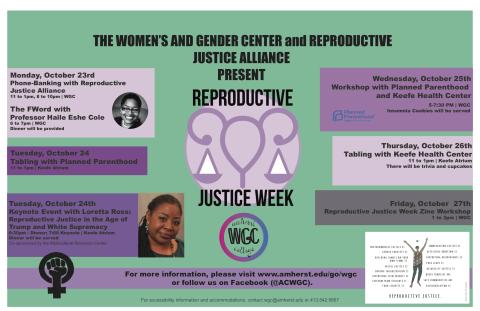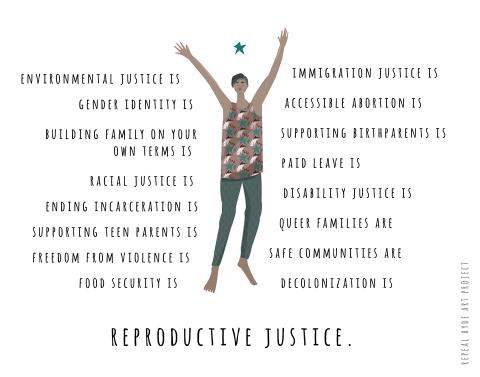Reproductive Justice Week
Reproductive Justice Week is a week of programs focusing on reproductive justice, abortion access, contraception, safe birth access, as well as empowering and supporting students. This program was created due to numerous student requests for programs and support on this topic. The program aims to increase knowledge about the politics of abortion access, as well as to provide students with the resources they need to make informed decisions about their sexual and reproductive health. Our goal is to critically engage with reproductive justice intersectionally and with particular attention to how structural oppression informs lived experiences. This program is a collaboration between the WGC and the Reproductive Justice Alliance, along with many campus and community partners.
Queering Reproductive Justice 2018
“Queering Reproductive Justice” means to broaden our understanding of reproductive justice and apply it to those at the margins of the margins. This year’s Reproductive Justice Week will focus on both queer as a community, and how reproductive justice applies to queer and trans narratives, and queer as a practice of “queering,” and how we can queer our ideas of what reproductive justice represents and encompasses.

What is reproductive justice?
The term "reproductive justice" was first developed by the activist Loretta Ross, the cofounder of SisterSong Women of Color Reproductive Justice Collective, who felt that the pro-choice movement was not inclusive enough of the needs of women of color.
"[Reproductive Justice] is an expansion of the theory of intersectionality developed by women of color and the practice of self-help from the Black women’s health movement to the reproductive rights movement, based on the application of the human rights framework to the United States. Reproductive justice is in essence an intersectional theory emerging from the experiences of women of color whose multiple communities experience a complex set of reproductive oppressions. It is based on the understanding that the impacts of race, class, gender and sexual identity oppressions are not additive but integrative, producing this paradigm of intersectionality. For each individual and each community, the effects will be different, but they share some of the basic characteristics of intersectionality – universality, simultaneity and interdependence.
Reproductive Justice is a positive approach that links sexuality, health, and human rights to social justice movements by placing abortion and reproductive health issues in the larger context of the well-being and health of women, families and communities because reproductive justice seamlessly integrates those individual and group human rights particularly important to marginalized communities. We believe that the ability of any woman to determine her own reproductive destiny is directly linked to the conditions in her community and these conditions are not just a matter of individual choice and access." - Loretta Ross

This image is from the Repeal Hyde Art Project. Used with permission.